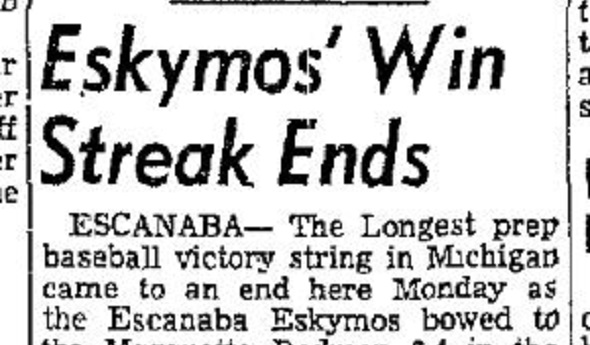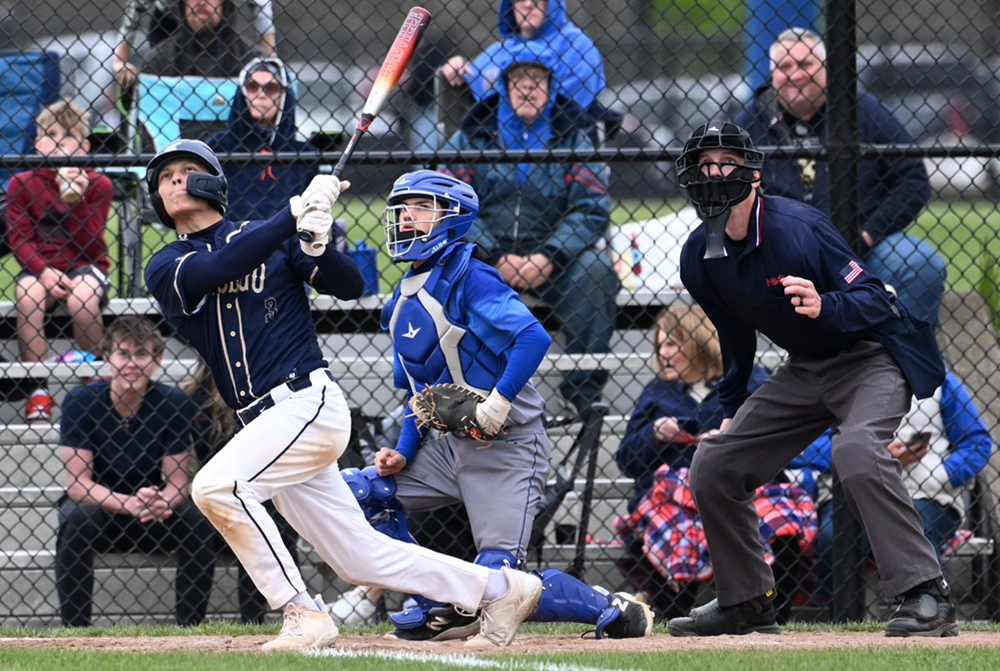
#TBT: Escanaba Streaks into History
May 21, 2015
By Geoff Kimmerly
Second Half editor
Thanks in part by “lanky righthander” Harlan Breitzman and his 14 pitching wins over the 1954 and 1955 seasons, Escanaba entered the spring of 1956 having won 43 straight games.
Statewide news at the time, that streak ended in the season opener with a 6-4 loss to rival Marquette. But it remains one of the longest in MHSAA baseball history – and certainly the longest in terms of seasons, stretching over six during the early decades of high school baseball, when many teams played far fewer games than at present and with the start of an MHSAA Tournament for the sport still two decades away.
Escanaba won 43 straight beginning with its third game of 1950 through the end of the 1955 season. The team played eight games at most during those seasons – but strung together five straight perfect runs. According to a Detroit Times story previewing the start of Escanaba’s 1956 campaign, five of the team’s eight 1955 wins were shutouts. The Times also reported that Breitzman, a graduate the previous spring, had signed with the Brooklyn Dodgers.
At the time, the Eskymos’ streak would’ve ranked behind only that of Muskegon’s 1941-45 teams that won 55 straight. Homer owns Michigan’s longest (and the nation’s third longest) baseball winning streak: 75 games from opening day 2004 until a 7-6 loss to Saginaw Nouvel in the 2005 Division 3 Final.
(Research courtesy of MHSAA historian Ron Pesch.)
PHOTO: An Ironwood Daily Globe headline announces the end of the Escanaba baseball team's winning streak at the start of the 1956 season.

Be the Referee: Appeal Play
By
Paige Winne
MHSAA Marketing & Social Media Coordinator
May 29, 2024
Be The Referee is a series of short messages designed to help educate people on the rules of different sports, to help them better understand the art of officiating, and to recruit officials.
Below is this week's segment – Appeal Play - Listen
We’re on the diamond, and we’ve got the bases loaded with one out. The batter hits a fly ball, and all three runners take off. The fly ball is caught for out number two. The fielder throws to first base for out number three – which is technically an appeal play, not a force out, with the runner leaving early. But before that out is recorded, the runner who left third base early crosses the plate.
Does that run count?
It depends!
If the defense appeals to third base before leaving the field of play, they would be awarded a fourth out, and the run would not count.
But if they fail to appeal, or if they all run to the dugout before realizing an appeal is needed, then yes, the run would count – even though the runner failed to tag up.
Previous Editions
May 21: Lacrosse Foul in Critical Scoring Area - Listen
May 14: Avoiding the Tag - Listen
May 7: Baseball Pitch Count - Listen
April 30: Boys Lacrosse Helmets - Listen
April 23: Softball Interference - Listen
April 16: Soccer Red Card - Listen
April 9: Batted Baseball Hits Runner - Listen
March 12: Basketball Replay - Listen
March 5: Hockey Officials - Listen
Feb. 27: Less Than 5 - Listen
Feb. 20: Air Ball - Listen
Feb. 13: Hockey Penalties - Listen
Jan. 30: Wrestling Tiebreakers - Listen
Jan. 23: Wrestling Technology - Listen
Jan. 9: 3 Seconds - Listen
Dec. 19: Unsuspecting Hockey Hits - Listen
Dec. 12: No More One-And-Ones - Listen
Nov. 21: Football Finals Replay - Listen
Nov. 14: Volleyball Unplayable Areas - Listen
Nov. 7: Pass/Kick Off Crossbar - Listen
Oct. 31: Cross Country Interference - Listen
Oct. 24: Soccer Overtime - Listen
Oct. 17: Tennis Spin - Listen
Oct. 10: Blocked Kick - Listen
Oct. 3: Volleyball Double & Lift - Listen
Sept. 26: Registration Process - Listen
Sept. 20: Animal Interference - Listen
Sept. 13: Feet Rule on Soccer Throw-In - Listen
Sept. 6: Volleyball Jewelry - Listen
Aug. 30: Football Rules Similarities - Listen
Aug. 23: Football Rules Differences - Listen
(Photo by Gary Shook.)

